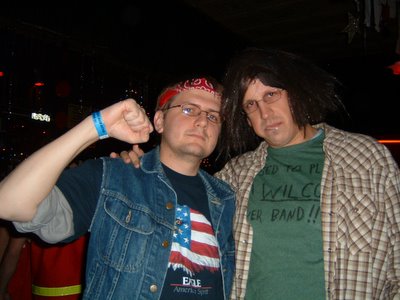One of my students wrote this and I sent it to Huevos McGringo--basically so we could relive our days in Human Nature and the Social Order (OU's pretentious name for the core poli-sci course). He said I should post it, so...w/o further delay...Also, I changed the name to X (George Kennan style), to protect the innocent.
X
AP European History
Mr. Knight
October 23, 2005
The Philosophes in Loco's
As Mr. Knight sauntered into the pub at Loco's, he noticed John Locke, Thomas Hobbes, Jean-Jacques Rousseau, and the baron de Montesquieu at a small table in the corner. He quietly observed these intellectuals for a moment, detecting the cloud of tension that rested around their table. Locke sat his beer mug on the table and looked up to see Mr. Knight. "Mr. Knight!" he called, "Please come join us!" Mr. Knight timidly accepted Locke's invitation and walked slowly to the table, partly excited to be in the company of these philosophes, but somewhat intimidated by their repute.
As Mr. Knight softly slid a chair to the table, Hobbes shouted to the bartender to bring one more mug and another pitcher of beer. The gentlemen toned down the conversation for a while and became better acquainted. Inevitably, though, the discussion turned to the politics of the United States.
"That buffoon can't control his own people," said Hobbes, sharply, referring to George W. Bush. "His every move has to be approved by hundreds of people..."
"As well it should be," interjected Montesquieu. "It is more just to have a balanced government than to give absolute power to one man."
"I disagree. With all of his limitations, the man can't keep the favour of his own people. This 'presidency' is hindered by its own circumstances. Give the man more power and see what he can do," argued Hobbes.
Mr. Knight laughed to himself as he listened to Hobbes reverberate the ideas of the conservative Republicans in his AP European History class.
Rousseau was obviously miffed by the irrational words of Hobbes. He calmly leaned back in his chair and began: "Mr. Hobbes, with all due respect, are you mad? Government is a corruption imposed upon the people. It is dreadful enough already; why expand the evil? I say let the people decide. The people know what is in their best interest. Why, then, should they let an illiterate buffoon try to convince them otherwise?"
"You idiot!" interjected a drunken Hobbes. "What good is a nation without a leader?"
"Gentlemen, gentlemen, please calm down," Locke began. "There is no need to become heated. Mr. Rousseau, let us not cause another revolution, and please, Hobbes, no absolutism. Government is a fine institution when conducted properly. The government of the United States of America has succeeded in protecting the rights of the people. Some minor rights have been infringed upon, but I see no just cause for condemnation and revolution. Rousseau, I do agree with you in that the people should represent themselves. Americans, however, choose to elect their representatives. This representative democracy, although it is indirect, allows a free-market economy to thrive. Because of the brilliance of our friend Montesquieu, the American government remains constant, neither too weak nor too powerful. This separatio n of powers allows the political machine to run smoothly." Locke paused momentarily and glanced at Mr. Knight. "Gentlemen, you must look at the success of this nation before attacking the specific flaws of this government. Every government contains shortcomings and defects, but this nation has remained. The first government established in the United States of America over two centuries ago has not failed yet failed its people. Gentlemen, please examine the positive aspects as you attack the negative."
Mr. Knight took a deep breath and wiped a tear from his eye. Locke's words deeply penetrated his heart and he was indeed proud to be an American. "Thank you, Mr. Locke." Mr. Knight said respectfully. "I believe this government has provided for the American people through many changes and adversities. The American government has preserved my rights. I don't necessarily agree with all of the policies the government chooses, but I still think this government is awesome."
Hobbes and Rousseau found consolation in the inspirational words of Mr. Knight. While they still retained their own opinions, both of the philosophes agreed that government is relative.
Montesquieu sat thoughtfully during the silence at the table. Finally, he broke the silence: "Mr. Knight, what is it that you do?"
"I am a history teacher, sir," Mr. Knight replied.
"United States History, I presume."
"Actually, I teach AP European History and World History. We just finished studying the Enlightenment in my European History class. All of you definitely impacted government philosophy. Thank you all for your contributions."
After a few more drinks and a lighter conversation, Mr. Knight realized that it was past Pudge's bedtime. He thanked the philosophes again and hurried home to tuck Pudge in and prepare for his awesome European History lecture the next day.



